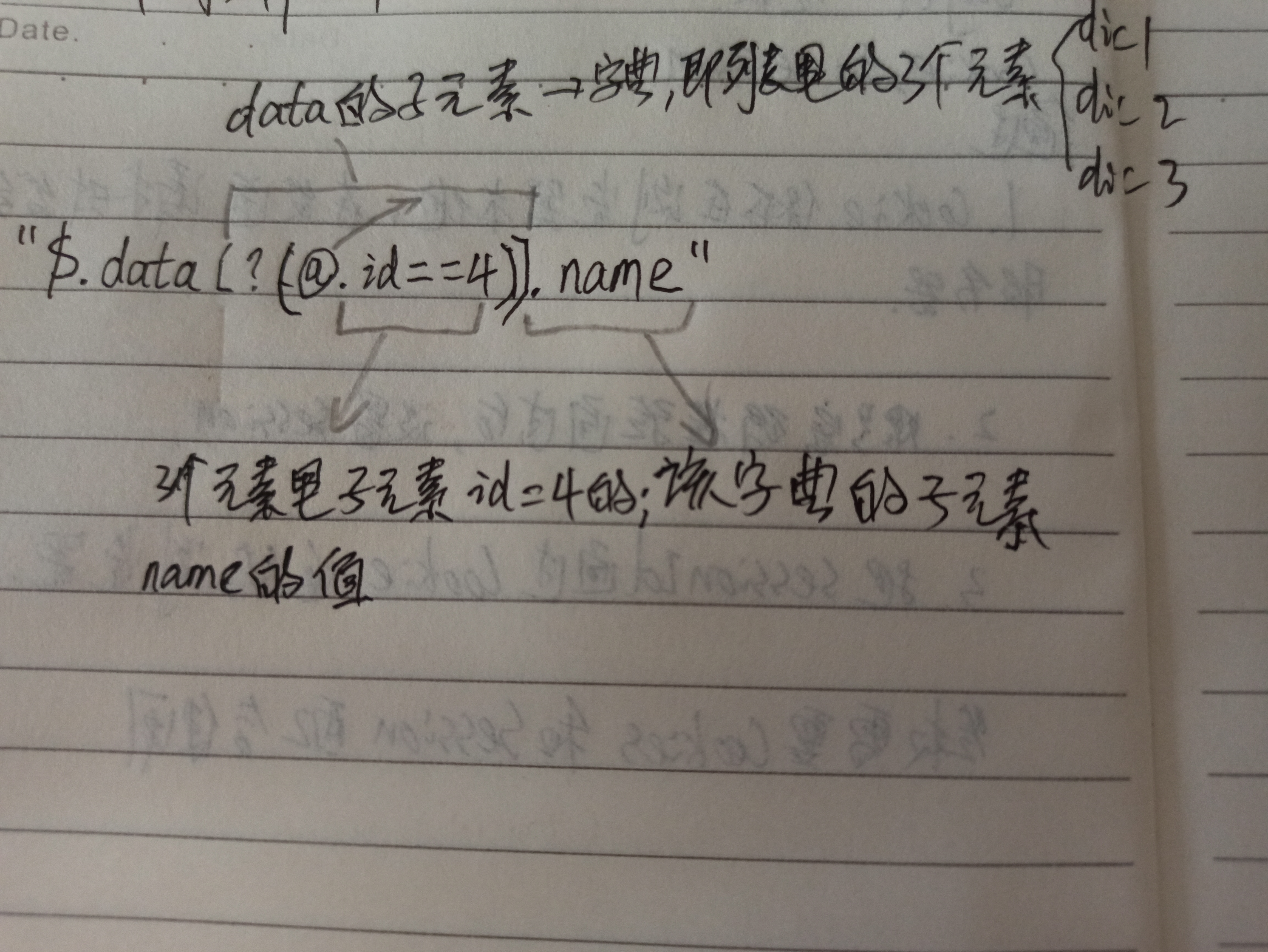python 中jsonpath模块
from jsonpath import jsonpath
一、概念,jsonpath是什么
jsonpath是一种简单的方法,来提取给定json文档中的部分内容;
jsonpath方法需要两个参数,一个是数据,一个是jsonpath表达式;
官方给出的函数定义:
def jsonpath(obj, expr, result_type='VALUE', debug=0, use_eval=True)
注意:
如果没有匹配到数据,返回False;
如果匹配到数据,返回的是包含数据的列表;
返回的是list列表,如果要用返回的数据,记得用下标取数;
二、jsonpath的语法
| jsonpath |
解释 |
Description |
| $ | 根元素 | the root object/element |
| . 或 [] | 子元素 | child operator |
| .. | 递归下降。JSONPath从E4X借用了这个语法。 | recursive descent. JSONPath borrows this syntax from E4X. |
| @ | 当前元素 | the current object/element |
| ?() | 应用过滤表达式;一般需要结合[?(@ )]来使用 | applies a filter (script) expression. |
| [] | (数组)下标操作符。XPath使用它遍历元素集合和谓词。在Javascript和JSON中,它是原生数组操作符。 | subscript operator. XPath uses it to iterate over element collections and for predicates. In Javascript and JSON it is the native array operator. |
| [,] |
选择多个字段; 也可以切片[m:n],但是不能这样使用[-1] |
Union operator in XPath results in a combination of node sets. JSONPath allows alternate names or array indices as a set. |
| () | 脚本表达式,使用在脚本引擎下面 | script expression, using the underlying script engine. |
@一般和条件过滤一起使用,如 [?(@.条件)];
三、实例
data3={'code':200,'data':[{'id':1,'name':'lili'},
{'id':4,'name':'lucy'},
{'id':2,'name':'keepr'},]}
# 取data下的第一个名字
print(jsonpath(data3,"$.data[0].name"))
# 等同于上面,因. []都代表子元素;同时[]代表数组索引
print(jsonpath(data3,"$.[data][0][name]"))
# 取id等于4的name,此时用到条件筛选
print(jsonpath(data3,"$.data[?(@.id==4)].name"))
运行后结果
['lili'] ['lili'] ['lucy']
四、其他
关于条件筛选,为方便记忆与理解,做了下拆分;如果有误,欢迎各位大佬指正,感谢






【推荐】国内首个AI IDE,深度理解中文开发场景,立即下载体验Trae
【推荐】编程新体验,更懂你的AI,立即体验豆包MarsCode编程助手
【推荐】抖音旗下AI助手豆包,你的智能百科全书,全免费不限次数
【推荐】轻量又高性能的 SSH 工具 IShell:AI 加持,快人一步
· 被坑几百块钱后,我竟然真的恢复了删除的微信聊天记录!
· 没有Manus邀请码?试试免邀请码的MGX或者开源的OpenManus吧
· 【自荐】一款简洁、开源的在线白板工具 Drawnix
· 园子的第一款AI主题卫衣上架——"HELLO! HOW CAN I ASSIST YOU TODAY
· Docker 太简单,K8s 太复杂?w7panel 让容器管理更轻松!